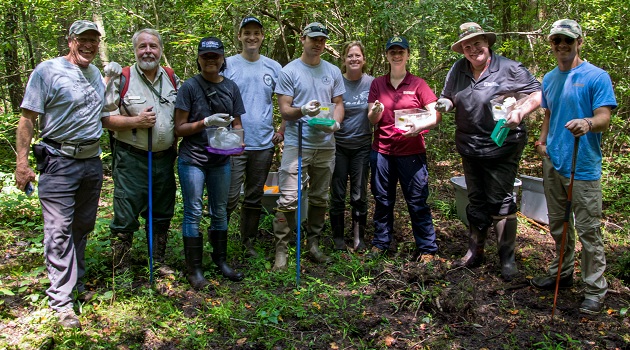In 2019, more than 200 illegally obtained eastern box turtles were confiscated by the South Carolina Department of Natural Resources (SCDNR).
SCDNR partnered with the University of Georgia Savannah River Ecology Lab (SREL) to care for these turtles, providing an opportunity for graduate students at SREL. An $8,750 grant from Riverbanks Zoo and Garden’s Satch Krantz Conservation Fund supported research by one student, Ryan Rimple, to study movement, survival, and disease transmission of the turtles and their offspring.
All the originally confiscated adult turtles have since been released; and in June 2023, Riverbanks, SCDNR, and the SREL released many of their hatchlings.
“It’s not a pleasant sight; over 200 box turtles, packed into bins, with no substrate, no access to food or water, malnourished and dehydrated, some of which were already deceased,” SCDNR State Herpetologist Andrew Grosse. “Going from that to releasing hatchlings from some of these same individuals four years later feels like a small win from an otherwise bad situation.”
Eastern box turtles are among many North American native turtle species that are overharvested for illegal trade. Turtles are long-lived, often taking a decade or more to reach maturity. For a healthy population there must be many adults.
“Studies have shown that the removal of even a single adult can initiate the downward trajectory of an otherwise healthy population; the removal of this many turtles from wild populations is not only not sustainable but likely led to declines or complete extirpation of localized populations,” Grosse said.
This specific confiscation was one of many that helped SCDNR, Riverbanks, and other stakeholders advocate for legislation to redefine native turtle ownership and trade laws in South Carolina. In 2020, Governor Henry McMaster signed a bill at Riverbanks that bans most commercial trade of the 13 native turtle species in South Carolina. Wild turtle ownership laws were also tightened up, marking a turning point in the state’s stance on addressing wildlife trafficking.
Riverbanks’ Conservation Project Manager Hunter Balog, said, “This was a fantastic opportunity for our staff to see the results of years of hard work to repatriate these turtles back where they belong.”
Riverbanks encourages all South Carolinians to help protect our native species with these tips:
When you see a turtle in its natural habitat, leave it alone. Removing turtles can affect their populations and potentially spread diseases to household pets or humans.
Don’t add specific locations to pictures of turtles online. Wildlife traffickers are known to use publicly available locations to track down turtles and other wildlife.
Do your research before you consider getting a turtle for a pet. Did it come from a reputable source? Is the species endangered? Many turtle and tortoise species live a long life and require very specific care.



